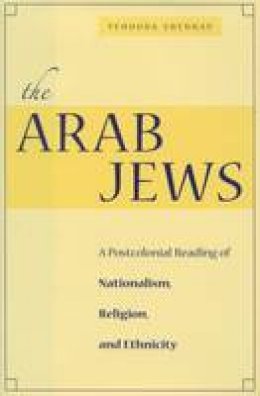
Stock image for illustration purposes only - book cover, edition or condition may vary.
The Arab Jews: A Postcolonial Reading of Nationalism, Religion, and Ethnicity
Yehouda Shenhav
€ 89.12
FREE Delivery in Ireland
Description for The Arab Jews: A Postcolonial Reading of Nationalism, Religion, and Ethnicity
Hardback. This book is about the social history of the Arab Jews-Jews living in Arab countries-against the backdrop of Zionist nationalism. Series: Cultural Sitings. Num Pages: 280 pages, Illustrations. BIC Classification: HBJF; JFSR1; JPFN. Category: (P) Professional & Vocational; (UP) Postgraduate, Research & Scholarly; (UU) Undergraduate. Dimension: 5817 x 3887 x 22. Weight in Grams: 508.
This book is about the social history of the Arab Jews-Jews living in Arab countries-against the backdrop of Zionist nationalism. By using the term Arab Jews (rather than Mizrahim, which literally means Orientals ) the book challenges the binary opposition between Arabs and Jews in Zionist discourse, a dichotomy that renders the linking of Arabs and Jews in this way inconceivable. It also situates the study of the relationships between Mizrahi Jews and Ashkenazi Jews in the context of early colonial encounters between the Arab Jews and the European Zionist emissaries-prior to the ... Read more
This book is about the social history of the Arab Jews-Jews living in Arab countries-against the backdrop of Zionist nationalism. By using the term Arab Jews (rather than Mizrahim, which literally means Orientals ) the book challenges the binary opposition between Arabs and Jews in Zionist discourse, a dichotomy that renders the linking of Arabs and Jews in this way inconceivable. It also situates the study of the relationships between Mizrahi Jews and Ashkenazi Jews in the context of early colonial encounters between the Arab Jews and the European Zionist emissaries-prior to the ... Read more
Product Details
Publisher
Stanford University Press
Format
Hardback
Publication date
2006
Series
Cultural Sitings
Condition
New
Number of Pages
279
Place of Publication
Palo Alto, United States
ISBN
9780804752961
SKU
V9780804752961
Shipping Time
Usually ships in 15 to 20 working days
Ref
99-15
About Yehouda Shenhav
Yehouda Shenhav is Associate Professor of Sociology and Anthropology at Tel Aviv University. He is the author of Manufacturing Rationality (1999) and The Organization Machine (1995, in Hebrew); and the editor of Mizrahim in Israel (2002, in Hebrew) and Coloniality and the Postcolonial Condition (2004, in Hebrew).
Reviews for The Arab Jews: A Postcolonial Reading of Nationalism, Religion, and Ethnicity
...this is a brave, fascinating, excellent book that will mark an important turning point in the study of Jews from Arab and Islamic countries and their relationship to the Jewish state.
xMiddle East Journal The cultural conflict faced by Jews, functioning under what might be considered a common ideology-Zionism-is deftly analyzed.
Association of Jewish Libraries ... Read more Shenhav provides an erudite account of how the history of the Arab Jews complicates the presuppositions undergirding teleological and state-centered Zionist historiography... Because his approach does not subscribe to a simple dichotomisation between secular and religious interpretations of national identity, Shenhav's recognition of the elastic nexus of religion, nationalism and ethnicity may contribute a valuable framework for future reflections on the role of religion in conflict and peace-building.
Nations and Nationalisms Show Less
xMiddle East Journal The cultural conflict faced by Jews, functioning under what might be considered a common ideology-Zionism-is deftly analyzed.
Association of Jewish Libraries ... Read more Shenhav provides an erudite account of how the history of the Arab Jews complicates the presuppositions undergirding teleological and state-centered Zionist historiography... Because his approach does not subscribe to a simple dichotomisation between secular and religious interpretations of national identity, Shenhav's recognition of the elastic nexus of religion, nationalism and ethnicity may contribute a valuable framework for future reflections on the role of religion in conflict and peace-building.
Nations and Nationalisms Show Less
